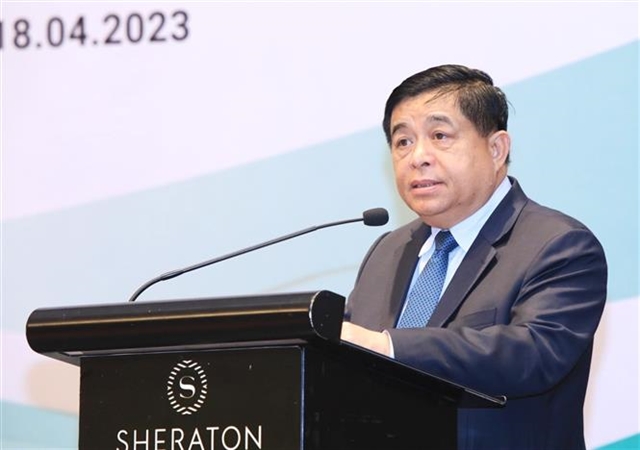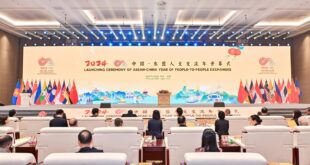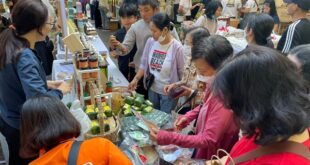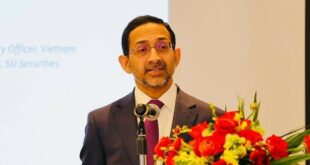
|
| Nguyễn Chí Dũng, Minister of Planning and Investment. — VNA/VNS Photo |
Việt Nam aspires to evolve into a developing country with a modern industry and high average income by 2030, followed by achieving developed country status with high income by 2045. Minister of Planning and Investment Nguyễn Chí Dũng discusses with Vietnam News Agency the pivotal role of implementing three strategic breakthroughs – institutions, infrastructure, and human resources – in realising this vision.
How can we realise Việt Nam’s vision of becoming a developed country with high income by 2030 and 2045?
Achieving Việt Nam’s development goals for 2030 and 2045 involves overcoming significant challenges through strategic breakthroughs in institutions, infrastructure, and human resources. In the era of the Fourth Industrial Revolution (Industry 4.0), proactive nations thrive, while passivity leads to setbacks.
Among the identified breakthroughs, the institutional one stands as the foremost and pivotal foundation for subsequent successes. The implementation clarifies major relationships outlined in Party Congresses, such as the balance between stability, innovation and development, economic and political innovation and adherence to market rules while ensuring socialist orientation. Varied approaches are required for each breakthrough.
Institutional breakthrough requires continuous innovation, intertwining top-down and bottom-up approaches for practical, comprehensive and widespread effectiveness during policy implementation. Ensuring synchronisation across stages, industries, and sectors is crucial, particularly in the context of technological advancements, knowledge-based development, with people at the forefront of the digital transformation process. Human resources are pivotal for growth, productivity and overcoming the middle-income trap.
The Party emphasises synchronous and modern infrastructure development as a key aspect of the socio-economic strategy for 2021-30, aiming to enhance the system for rapid and sustainable development.
In 2024, the world economy and politics are expected to be challenging, impacting our domestic economy. Could you share how we plan to achieve socio-economic goals and support business recovery in this tough environment?
In the upcoming year, the Government aims to overcome challenges, address economic bottlenecks, and mobilise widespread investment from society. This aligns with the socio-economic development goal for 2024 and the five-year Plan 2021-2025 set by the Party Central Committee and the National Assembly.
To achieve these goals, the Ministry of Planning and Investment has suggested the Government prioritise stimulating economic growth, maintaining macroeconomic stability, and ensuring key balances. Three growth drivers – renewing old ones and effectively utilising new avenues – are emphasised. Additionally, three strategic breakthroughs in institutions, infrastructure, and human resources are actively pursued through continual review and improvement of laws, mechanisms, and policies. Efforts focus on reducing administrative procedures, enhancing the business environment, and fostering investment.
Strategic infrastructure projects, especially in highways, airports, ports, urban and inter-regional infrastructure, digital infrastructure, social infrastructure, healthcare and education, are being expedited. Special attention is given to developing high-quality human resources, aligning with advancements in science, technology and innovation.
A substantial focus is placed on restructuring the economy, improving labour productivity, and fostering innovation, digital and green transformations. Efforts include encouraging the development of new economic models, e-commerce and border trade.
In economic diplomacy, the Government aims to attract high-quality foreign investment, particularly in emerging fields, and actively participate in multilateral forums to enhance the country’s international standing and reputation.
Could you share the new developments and outcomes of public investment disbursement in 2023, considering its crucial role in driving Việt Nam‘s economic growth?
In 2023, substantial capital is required for the five-year plan 2021-2025, focusing on socio-economic recovery. Alongside the National Assembly’s planned funds, there’s an additional budget for the socio-economic recovery and development programme. The political system, guided by the Politburo, Secretariat, and with support from various entities, actively implements the 2023 public investment plan.
Positive results are evident. Public investment’s structure aligns with economic restructuring, fostering balanced growth. The investment-to-GDP ratio has increased and State budget-funded investments have risen.
Public investment plays a leading role in driving economic growth, attracting resources from non-state sectors. Expected disbursement in 2023 is set to reach 95 per cent of the plan (compared to 91.42 per cent in 2022), reaching a historic high of nearly VNĐ676 trillion (US$28.2 billion), a VNĐ146 trillion increase from 2022. Institutions are continuously amended to address challenges. Improved capacities in production, services and economic infrastructure significantly contribute to economic growth and social security.
Attracting foreign direct investment (FDI) is a positive aspect of the economic landscape in 2023. Could you share your perspectives, goals and plans for attracting foreign capital flows in the near future?
In 2023, despite economic challenges, Việt Nam has achieved remarkable success in attracting foreign investment. The total registered investment capital hit a record high of $36.6 billion, a 32.1 per cent increase from 2022, reflecting strong foreign investors’ interest. This underscores Việt Nam’s reputation as a stable, attractive and promising investment destination. Disbursed capital also reached a new peak at $23.18 billion, a 3.5 per cent increase from 2022.
Việt Nam’s strategy for attracting foreign investment in the future involves proactive collaboration with selective investors, focusing on quality, efficiency, technology, and environmental sustainability. The emphasis is on prioritising projects with high added value, advanced technology, partnerships with domestic businesses, spillover effects, and integration into global production and supply chains.
Key investment areas include electricity, electronics, semiconductors, renewable energy, highly efficient agriculture, digital economy, digital transformation, innovation, research and development, and the establishment of a financial centre.
How should the National Innovation Centre (NIC), which came into operation last year in accordance with Resolution No. 52-NQ/TW, support Vietnamese businesses in actively engaging with the Industry 4.0?
NIC, a Ministry of Planning and Investment initiative mentioned in the XIII Congress Document, signals the Party and State’s commitment to fostering innovation in the Industry 4.0. Resolution No. 52-NQ/TW outlines the goal of establishing a business-centric innovation system, aligning with the Ministry’s role in advising socio-economic strategies and supporting businesses.
Operating within the Ministry’s framework, NIC focuses on promoting business innovation and supporting startups. It initiates programmes for digital transformation, resource provision for innovation and entrepreneurship, and fostering connections within the startup ecosystem.
To boost Vietnamese businesses’ participation in the Industry 4.0, NIC targets eight key areas: smart cities, smart factories, cyber security, digital content, environmental technology, medical technology, semiconductor industry, and green hydrogen technology, with a focus on the semiconductor industry’s value chain.
The centre’s facilities offer testing areas following global models, and collaboration with partners continues to provide support, consultation, and connection programs for businesses, enhancing technological capacity and facilitating digital transformation.
Regarding mechanisms and policies, the Ministry of Planning and Investment plans to propose special measures to the Government and Prime Minister, ensuring improved support for the centre’s innovation and entrepreneurship initiatives. — VNS
- Reduce Hair Loss with PURA D’OR Gold Label Shampoo
- Castor Oil Has Made a “Huge” Difference With Hair and Brow Growth
- Excessive hair loss in men: Signs of illness that cannot be subjective
- Dịch Vụ SEO Website ở Los Angeles, CA: đưa trang web doanh nghiệp bạn lên top Google
- Nails Salon Sierra Madre
 VnExpress News The News Gateway of Vietnam
VnExpress News The News Gateway of Vietnam




